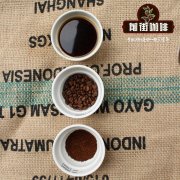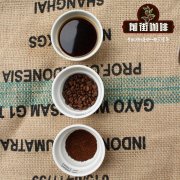Kenya PB Kenya Coffee grading system

Professional coffee knowledge exchange more coffee bean information please follow the coffee workshop (Wechat official account cafe_style)
The coffee grading system in Kenya is under the policy of government-led management of quality and guidance to coffee farmers.
The Kenya Coffee Agency, an official unit set up by the government after the coffee is harvested, is established.
(Coffee Board of Kenya referred to as CBK), founded in 1933, in the capital Nairobi
(Nairobi) Coffee Exchange (the Nairobi Coffee Exchange) conducts weekly
A regular auction, an auction system managed by the government as a whole, according to the grading system
Taking "particle size", weight, shape and appearance as the standard is the basis for the main auction price.
The official grading system for raw beans in Kenya is as follows:
Class E (elephant beans):
This grade is the largest grain grade of Kenyan coffee beans, above 18 mesh (18 + 64 "), also known as
The quantity of elephant beans is so small that this grade of goods can hardly be seen in the Taiwan market.
AA level:
Particle size (Screen Size) between 17 and 18 meshes (7.20mm sieve)
AB level:
Particle size (Screen Size) is between 15 and 16 meshes (6.8mm--6.2mm sieve)
Accounts for the majority of output, and is also the most common grade of raw beans.
PB level:
Round raw beans, accounting for about 10% of all coffee beans
Level C:
Particle size (Screen Size) between 12 and 14 meshes (4.8mm--5.6mm sieve)
TT level:
From AA and AB grade beans, lighter raw beans blown by an airflow filter
It means that the bean is soft and the hardness is not up to standard.
Level T:
Particle size (Screen Size) less than 12 mesh size (4.8mm screen)
From C-grade beans, the lighter beans are blown out with an airflow filter.
It means that the beans are soft, the hardness is not up to standard, and they are small particles, containing some broken and defective beans.
MH/ML level:
Beans that have not been washed and have not been selected because they have been harvested
Falling beans, accounting for about 7% of all coffee beans, belong to the lowest grade beans, only for
Kenyan domestic demand market.
In addition to the above Kenyan national official grading system, other private companies Kenyan exporters
Or raw bean traders, for AA and AB grades of coffee, raw beans are added to the private sector.
Special classification (not officially recognized by Kenyan countries), common ones are: AA TOP,AA+ (plus)
AA++ (double plus), AB+ (plus) and AA FAQ.
"FAQ" is the abbreviation of Fair Average Quality, which means "average"
Fair quality, which is an average standard quality, is the basic model of the AA grade.
AB+ (plus):
Although the grain of this grade is smaller than that of AA, it is a coffee tree with the highest percentage of fruit.
To grade, the largest one is of course the highest price, a little smaller than the largest one, and the flavor is not
It is relatively poor, so we should make a conclusion according to the cup test results. AB class plus plus (+), the same one.
Douzi, because of human factors, the standards of Company An and Company B are different, so they will
Produce different results, after all, there is no unified grading standard for this grade, if you add
Plus (+) will certainly be more attractive.
AA+ (plus) & AA++ (double plus):
AA level has the problem of adding plus (+) or + + (double plus), the same one
Douzi, because of human factors, the standards of Company An and Company B are different, so they will
Produce different results, after all, there is no unified grading standard for coffee flavor.
Cup test results, there is no standard to grade AA+ (plus) or AA++ (double plus)
Can only be used as a reference, everything still has to return to their own cup test.
AA TOP:
As in the case of AA+ (plus) & AA++ (double plus), test the results by cup.
Grading is not the official grading standard of Kenya at present, exporters.
If you add it by yourself, it is inevitable that there will be commercial behavior factors, so it can only be regarded as
For reference, everything still has to return to their own baking cup test, is the correct reality.
END
Important Notice :
前街咖啡 FrontStreet Coffee has moved to new addredd:
FrontStreet Coffee Address: 315,Donghua East Road,GuangZhou
Tel:020 38364473
- Prev

Tiger Mantenin Flavor Story introduction to the taste and flavor of Kaddura and tin pickup coffee beans
Tiger Manning's attention varieties are Kaddura, Iron pickup and Sidikalong, with sour taste of lemon or citrus, clean citric acid taste and sweet finish. This tiger manning is well-balanced and clean, with obvious flavors of cream, dark chocolate, caramel and nuts. Its raw bean body is round, green and yellowish, with good uniformity and moisture content.
- Next

Introduction to the Origin of Coffee in Yunnan small Coffee Plantation
Yunnan's high-quality geographical and climatic conditions provide good conditions for the growth of small-grain coffee. The planting areas are Lincang, Baoshan, Simao, Xishuangbanna, Dehong and other prefectures. Dehong Hougu Coffee Co., Ltd. is better. Small-grain coffee in the Science and Technology Museum, No. 1 Cuihu West Road, Kunming, Yunnan Province, is suitable for growing in the mountains at an altitude of 800 to 1800 meters. If the elevation is too high, it will taste sour, and if it is too low, it will taste bitter.
Related
- Detailed explanation of Jadeite planting Land in Panamanian Jadeite Manor introduction to the grading system of Jadeite competitive bidding, Red bid, Green bid and Rose Summer
- Story of Coffee planting in Brenka region of Costa Rica Stonehenge Manor anaerobic heavy honey treatment of flavor mouth
- What's on the barrel of Blue Mountain Coffee beans?
- Can American coffee also pull flowers? How to use hot American style to pull out a good-looking pattern?
- Can you make a cold extract with coffee beans? What is the right proportion for cold-extracted coffee formula?
- Indonesian PWN Gold Mandrine Coffee Origin Features Flavor How to Chong? Mandolin coffee is American.
- A brief introduction to the flavor characteristics of Brazilian yellow bourbon coffee beans
- What is the effect of different water quality on the flavor of cold-extracted coffee? What kind of water is best for brewing coffee?
- Why do you think of Rose Summer whenever you mention Panamanian coffee?
- Introduction to the characteristics of authentic blue mountain coffee bean producing areas? What is the CIB Coffee Authority in Jamaica?

